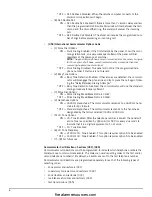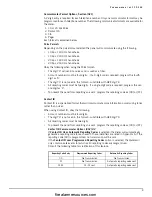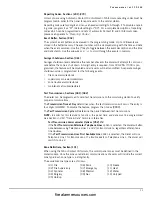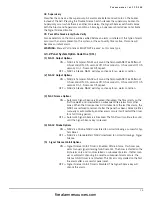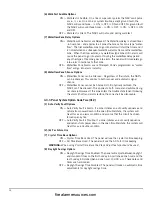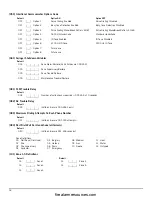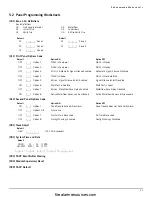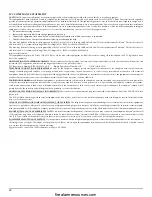
22
Section 6: Warranty and Warning Information
6.1 Warning
Please Read
Carefully
Note to Installers
This warning contains vital information. As the only individual in contact with system users, it is your
responsibility to bring each item in this warning to the attention of the users of this system. Failure to prop-
erly inform system end-users of the circumstances in which the system might fail may result in over-reliance
upon the system. As a result, it is imperative that you properly inform each customer for whom you install
the system of the possible forms of failure.
System Failures
This system has been carefully designed to be as effective as possible. There are circumstances, such as fire
or other types of emergencies where it may not provide protection. Alarm systems of any type may be com-
promised deliberately or may fail to operate as expected for a variety of reasons. Some reasons for system
failure include:
•
Inadequate Installation
A Fire Alarm system must be installed in accordance with all the applicable codes and standards in
order to provide adequate protection. An inspection and approval of the initial installation, or, after
any changes to the system, must be conducted by the Local Authority Having Jurisdiction. Such
inspections ensure installation has been carried out properly.
•
Power Failure
Control units, smoke detectors and many other connected devices require an adequate power supply
for proper operation. If the system or any device connected to the system operates from batteries, it
is possible for the batteries to fail. Even if the batteries have not failed, they must be fully charged, in
good condition and installed correctly. If a device operates only by AC power, any interruption, how-
ever brief, will render that device inoperative while it does not have power. Power interruptions of any
length are often accompanied by voltage fluctuations which may damage electronic equipment such
as a fire alarm system. After a power interruption has occurred, immediately conduct a complete
system test to ensure that the system operates as intended.
•
Failure of Replaceable Batteries
Systems with wireless transmitters have been designed to provide several years of battery life under
normal conditions. The expected battery life is a function of the device environment, usage and type.
Ambient conditions such as high humidity, high or low temperatures, or large temperature fluctua-
tions may reduce the expected battery life. While each transmitting device has a low battery monitor
which identifies when the batteries need to be replaced, this monitor may fail to operate as
expected. Regular testing and maintenance will keep the system in good operating condition.
•
Compromise of Radio Frequency (Wireless) Devices
Signals may not reach the receiver under all circumstances which could include metal objects placed
on or near the radio path or deliberate jamming or other inadvertent radio signal interference.
•
System Users
A user may not be able to operate a panic or emergency switch possibly due to permanent or tem-
porary physical disability, inability to reach the device in time, or unfamiliarity with the correct oper-
ation. It is important that all system users be trained in the correct operation of the alarm system and
that they know how to respond when the system indicates an alarm.
•
Automatic Alarm Initiating Devices
Smoke detectors, heat detectors and other alarm initiating devices that are a part of this system may
not properly detect a fire condition or signal the control panel to alert occupants of a fire condition for
a number of reasons, such as: the smoke detectors or heat detector may have been improperly
installed or positioned; smoke or heat may not be able to reach the alarm initiating device, such as
when the fire is in a chimney, walls or roofs, or on the other side of closed doors; and, smoke and
heat detectors may not detect smoke or heat from fires on another level of the residence or building.
Every fire is different in the amount and rate at which smoke and heat are generated. Smoke detec-
tors cannot sense all types of fires equally well. Smoke detectors may not provide timely warning of
fires caused by carelessness or safety hazards such as smoking in bed, violent explosions, escaping
gas, improper storage of flammable materials, overloaded electrical circuits, children playing with
matches or arson.
Even if the smoke detector or heat detector operates as intended, there may be circumstances when
there is insufficient warning to allow all occupants to escape in time to avoid injury or death.
•
Alarm Notification Appliances
Alarm Notification Appliances such as sirens, bells, horns, or strobes may not warn people or waken
firealarmresources.com
Содержание CFP-500
Страница 31: ...firealarmresources com ...

